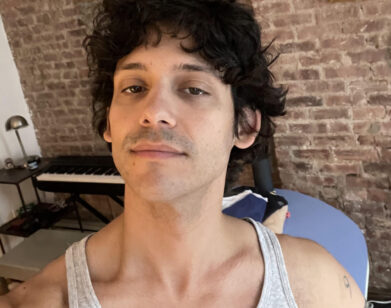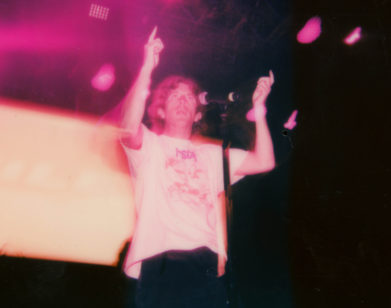Lit
Zadie Smith and Dev Hynes Grapple With the Eternal “Why”
This past August, two weeks before the release of her sixth novel, The Fraud, Zadie Smith could be found in her home in northwest London, trying to connect to Zoom to chat with her friend, the musician Dev Hynes. Smith is one of our few living novelists who doesn’t need a stream of adjectives or a list of accomplishments to remind a reader of their worth. She’s simply one of the most brilliant and dynamic minds at work in our messy, highly confused and confusing present. Her new novel, The Fraud, set in Victorian-era London, involves the spinster cousin of a popular writer who becomes increasingly obsessed with the trial of a man claiming to be the long lost inheritor of an aristocratic estate. Here, she and Hynes discuss the power of music, middle age injuries, rights and cultural revolutions, and what the best literature can and can’t do.
———
FRIDAY 7 PM AUG. 25 , 2023 LONDON
ZADIE SMITH: So my mom had to tell me how to use Zoom. Where are you, international Dev?
DEV HYNES: I’m in New York.
SMITH: Oh, nice. What happened to your hand?
HYNES: I broke my wrist.
SMITH: Your guitar hand?
HYNES: My dominant hand. I was playing football, actually. I was chasing the ball off the pitch onto the concrete and I slipped backwards and landed on my wrist and just snapped it.
SMITH: That’s a middle-aged accident, is what that is. Once, when I was at SoulCycle, I ran in the corridor in those shoes and fell similarly. It was more depressing because I felt like SoulCycle was a shameful activity in the first place.
HYNES: [Laughs] Are you at your home in London?
SMITH: I’m at home. My mom and I had some rum at lunch, and now I have a Bounty bar and some green tea, so it’s all going to be alright.
HYNES: Have you always loved Bounty? I didn’t really like it when I was younger.
SMITH: Bounty and Lilt were the cornerstones of the British Caribbean diet in the ’70s and ’80s.
HYNES: Something about the texture of whatever they call coconut.
SMITH: It’s probably not coconut. Anyway, sorry about how dark it is in my room.
HYNES: It’s fine. My apartment looks crazy, too. So how are you feeling?
SMITH: Crazy, to be honest. I feel in a high state of paranoia and anxiety. It does beg the question: Why do you make things if you don’t want those things to come out? What kind of psychological thing is that? I so enjoyed writing this book, and then I finished it and felt like everything’s great because I’ve finished it. It took about a month before I thought, “Oh, right. The second half of this experience is about to begin.” To me, it’s a peculiar mental state where the opposite of what you need to make the thing is what putting this thing out there involves. It’s the death of any artist, but you need to do it because otherwise nobody would read the books or listen to the music. So there’s no solution.
HYNES: Yeah, this is what’s been on my mind nonstop for the last five months.
SMITH: It’s just the way it is. Whenever you’re thinking, “Who made me do this?” The answer is you made you do this. This is literally your own fault. No one asked you to write, and this is the consequence. The lovely part about it is being in communication with other minds. For me, you need about 12 other minds, and they all give you a different opinion. Some will hate it, some will like it. But then in the actual business of the thing, many more people have to be involved. It’s a strange process. Imagine being Taylor Swift. The scale is unprecedented, like being Napoleon. Taylor Swift is a benign, wonderful Napoleon.
HYNES: Have you ever stumbled across versions of your characters in real life?
SMITH: While writing [the short story] The Embassy of Cambodia, I went to Pret [a Manger] on Broadway all the time. When I’m writing, I get into very fixed regimens. I’ll go to Chipotle every day for three months because it’s quicker and I want to get back to my desk. At this particular Pret, there were a lot of young African American staff and once a week someone would say, “Oh my god, are you Tracee [Ellis Ross]?” And I was like, “No, still not Tracee, but can I have my wrap?”
HYNES: [Laughs] Still not Tracee.
SMITH: That went on for months. And then really spookily, a month after I finished The Embassy of Cambodia, I went in and there was a girl at Pret with the name tag “Fatou,” who looked to me exactly how Fatou [the protagonist of The Embassy of Cambodia] would look. I was completely dumbstruck. I handed over my money, took the sandwich, and didn’t say a word to her, but I was inwardly praying that she wasn’t going to say, “Oh my god, are you Tracee?” It’s lovely when things like that happen. You always have a magical sense that you put something into the universe.
HYNES: Is The Fraud the longest period between the initial spark of the idea to the completion of a novel?
SMITH: The longest composition is [Smith’s 2012 novel] NW because I had a baby in the middle of writing that. So that novel always feels weird to me because half of it’s a book by a woman without children, and the other half is by a woman with children. Some of the wildness of that book is in that transition. But this one might’ve been the longest germination. I was doing other things in between. I wrote Intimations [a 2020 book of essays] and quite a few essays, but it was on my mind. And when I sat down to write it, it was only two years, maybe a bit less. It was quite quick.
HYNES: But you had heard about the [Tichborne] Claimant’s trial of 1960s London long beforehand?
SMITH: I searched my email to find out when I was first thinking about this case. The first mention of it was an email with an NW attachment. I opened it and it’s a scene from that novel, which I must have cut, where Bogle and Natalie are walking through Willesden Cemetery, which was just around the corner from my house, and she tells him the story about the Claimant, and Bogle explains why he’s defending the fraud. He says, “Sometimes you just want one of your own to win for once.” I don’t remember writing that section, but obviously in my mind there was that connection between that kind of personal or tribal identification with a person when you know they’re not telling the truth, but you don’t care because they’re representing something larger for you. Then, when Trump came along, he was another example of an upside-down character, a rich man pretending to be poor, to be of the people, a criminal pretending to be honest, an entertainer pretending to be a politician. And there was the same incomprehension by those people who think of themselves as rational. I’m the rational contingent on Trump, out of my mind trying to understand what the connection is between these people and a New York millionaire huckster. It took a really long time for those people who consider themselves to be rational to understand the deep emotional ties between audience and showman, but they exist. We know it because we’ve felt it ourselves.
HYNES: Do you ever doubt the project in the middle of writing it? Or do you just have complete conviction?
SMITH: If you’re going to make a long piece of creative work, you need to feel like you have no choice. The worst part in any project, whether it’s a song or a book, is when you’re 5 to 12 percent in, and you think, “This is not the one.” I’m sure most of us do carry on even when we know it’s not the one, and the reasons to do so are many.
HYNES: I think a lot of people do that.
SMITH: It’s practical. People need money. They’re invested in something, they’ve already signed a contract, and all those are completely viable reasons. But if it can possibly be avoided, it should be. For the good of the thing that you are doing, it has to have a sense of necessity. But at the same time, the necessity is complete fiction. You’ve made it up. Nobody is ever demanding you write a song, a poem, a novel—there is no need for these things in the world. It’s not bread, it’s not water. So the necessity is self-created, basically.
HYNES: The eternal “why” that I tend to wrestle with.
SMITH: If the why gets too big, you just stop. If I’m really honest with myself, I can feel the encroaching danger of why. When you are young, you don’t think twice, you’re just on a mission.
HYNES: You just do it.
SMITH: It’s so obvious that it has to be done. The older you get, you slow down. A wonderful thing about artists I really admire— [E.M.] Forster is such an old-fashioned version of it—is that sometimes they stop. Forster just stopped. He knew the point where it wasn’t necessary anymore and he didn’t write for 40 years. Of course you need the things he had. He had a private income, security from Cambridge. But plenty of people have both those things and keep going and make terrible work. I admire the person who’s able to say, “I did my work. And that’ll do.”
HYNES: There’s a grand societal shame around that. It’s almost like this duality where people want artists to change and grow, but also want them to stay the same.
SMITH: Musicians particularly. It’s because you’re so nostalgic about what they meant to you at a particular moment. I think music is the least forgiving when it comes to growth and change. We have the narrative about Dylan going electric. That’s a ridiculous fact that people are angry about it. It’s really wild.
HYNES: It’s extreme.
SMITH: The other thing is the intensity of emotion. The reason people are so crazy about music, the reason they’re throwing things at musicians onstage, is because it really matters to them, whereas literature doesn’t matter in the same way. I know because I love literature and I love music, but at my funeral I’m not having anyone read out chapters of a book. It’s going to be songs. In your calmer moments, books mean something to you. But in the dramas of life, it’s music that you’ll go to.
HYNES: It’s more instant and digestible.
SMITH: The emotion is so concentrated. I was talking to a friend who went to see Pulp recently, and she said when they played “Common People” everyone was overwhelmed. I remember thinking when I heard that song: About six of my books are better expressed in the song “Common People,” which lasts four minutes. Music is an intensification. You can say everything you need to say in four minutes. It took me like 900 pages to say exactly the same thing.
HYNES: I don’t fully agree, but also we’re talking about Jarvis [Cocker], so it’s a special case.
SMITH: It’s a work of genius.
HYNES: Is there music tied to the making of the new novel, or something you listened to?
SMITH: No. I listened to brown noise the whole time because it’s less aggressive than white noise. The only song that accompanied me, and it wasn’t what I was writing, but in-between for some reason, is that Lil Nas X song “Industry Baby.” Every few days I would put on the video and watch it and feel good.
HYNES: Good video.
SMITH: In my view, perfect. Sometimes when you’re writing, you really need cheerleading. When you’re in a gym, it’s the same. Something about that song, every time I listened to it, I’d be like, “Okay, let’s do this. Back to the Victorian novel!”
HYNES: Back to Mrs. Touchet [a character in The Fraud].
SMITH: The whole attitude of it was like, “Yeah, fuck this. I’m going to do it.” And the song is also a kind of fight against the one-hit wonder. I’m here and I’m not going anywhere. Also nothing about that video—the way it’s made, who is singing it—would have been possible 12 years ago. It’s inconceivable.
HYNES: I would say it would have been inconceivable 12 months before.
SMITH: When I see something like that, I think progress is possible. And the novel is a lot about that. Is progress possible? Can things actually change? How do they change? What are the consequences of them changing? What are the benefits? It sounds so insane, but when I watch that video, I’d think you’re looking at a video which is the culmination of a series of liberation movements—racial, gender, sex, even capital—because the way he made his original song [“Old Town Road”] was on a peer-to-peer internet without the interference of a record company. Halfway through writing the novel, I got a t-shirt made up with that lyric on it, “You was never really rooting for me anyway.” My daughter took one look at it and said, “If you ever wear that outside, I will not talk to you again.” So I wear it to bed sometimes.
HYNES: I love that. How much did you have to find out about Eliza Touchet to write her story?
SMITH: There’s nothing to find out. The life of a woman in the 19th century was written in water. You can’t find out a lot unless you are the wife of a great man, a daughter of a great man, or in some other way connected. But I think what interested me was the idea of frustration, like when people are frustrated by the things that they want to do or that are naturally in them. If a little child said to me, “What did you dream you want to be when you grew up?” The answer is writer. And I am a writer. So that kind of absolute frustration, I don’t have. I would’ve liked to have been a singer, but even if you laid them in front of me, singer or writer, I still would say writer. I’m glad I’m a writer. But I thought, with all the desire I had to write, what would it be like not to have any outlet? And then I started thinking about rights in general. The thing that really challenged me about the present revolution—it is a revolution in thought, in dynamics, and one of the big engines of this movement is to say that the arc of justice that’s meant to bend towards justice, go slowly in a certain orderly progression, is bullshit. Everybody deserves their rights immediately. I realized that I’ve been raised in this kind of gradualist tradition. Even if you don’t recognize it, it’s very deep in your subconscious when you are thinking about human rights. You’re thinking, well, first aristocrats have all this power, then the middle class, then working white men, then women, partially, then people of color, then gay people, then the queer community. As if it’s some kind of orderly, reasonable path. And what I thought was so interesting about the moment, in a revolutionary sense, is that there is no central subject around which the rest of us are satellites. Everybody is the central subject in their own existence. And there is no careful, slow, getting everybody prepared for their rights. Why should anybody be prepared to handle or be patient about their rights? That’s crazy. So that really interested me when writing the novel.
HYNES: I get the sense of that when reading the book.
SMITH: That simple English sentence, “Don’t make the perfect the enemy of good,” is so morally and politically important to me. Even when I was a kid, I loved those old musicals which were full of terribly degrading African American characterizations. I remember my mother saying to me early on, “Don’t despise those people. They were doing what they had to do to do those jobs.” And particularly in our case, watching Hattie McDaniel and thinking how wonderful she was, what an extraordinary actress, and how humiliating those roles so often were. I grew up having to contain both thoughts simultaneously all the time: That I admire this woman, I’m grateful for what she did, but at the same time, I wish she didn’t have to play those roles. The two things are not in contradiction. To me they’re just both facts. It’s possible to have more than one feeling at the same time.
HYNES: It’s the old Miles Davis attitude on Louis Armstrong. It was eventually resolved once Miles understood what Louis Armstrong had to do, was doing, what it meant.
SMITH: You need to understand who you are benefiting from. I don’t think there is a proper philosophical term for it, but I always think of it as moral luck. I am morally lucky because I’m born in a situation, in a moment, in a time where I don’t have to deal with those kinds of choices. So to pat yourself on the back for your moral luck is insanity. That’s no achievement of yours. That’s just: You are born in 1975. Well, whoop-de-whoop. So I’ve always thought about my moral luck in that context.
HYNES: Are you still singing these days?
SMITH: I’ve been obsessively playing that Billie Eilish tune off the Barbie soundtrack on the piano. It’s been blowing my mind. It’s literally made out of four chords: G, A, F, C. You didn’t think you could make a song out of those four chords anymore in human history. She’s managed to make this utterly heartbreaking, beautiful song. So I sit by the piano and play that, but no real singing. Miss it.
HYNES: I only heard that song two days ago. The real-life emotion comes through.
SMITH: I think music may be the only place that’s possible. It doesn’t make sense. It’s literally the Barbie soundtrack. Nothing could be more overdetermined, and yet. Maybe it’s because everybody else is doing these massive performances. Just the piano, just the voice. What a medium to work in.
HYNES: I had a moment two months ago where I suddenly got over myself and felt I had a sense of—well pride isn’t the right word—but my first moment of not being embarrassed in my entire life that I make music.
SMITH: It’s a beautiful thing. I wish we could both get rid of this sense of shame.
HYNES: Yeah. What is it? Is it a mixture of being English and from the islands?
SMITH: Yeah, maybe. And being the children of people who have proper jobs. Okay, now I’ve taken up too much of your time and must let you go.
HYNES: Zadie, I can’t think of a better way to spend my day.
———
Makeup: Daniel Kolaric using Pat McGrath Labs at Pat McGrath Labs.
Production: Concrete Rep.
Post-production: Solis Retouch.
Photography Assistant: Ed Phillips.









